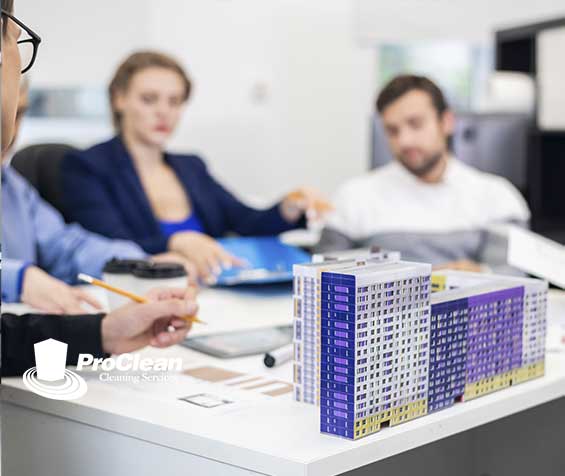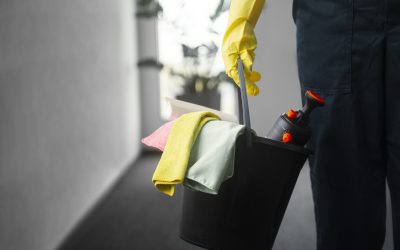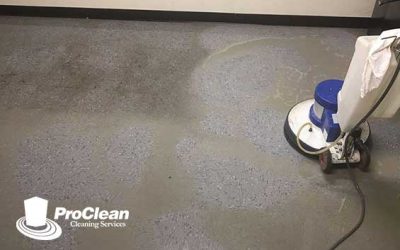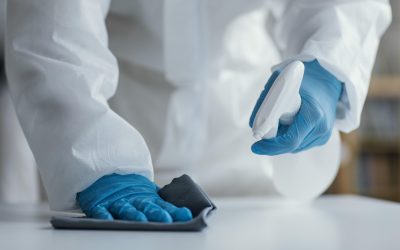As a property manager, maintaining a clean and well-organized environment is essential to attracting tenants and ensuring their satisfaction. However, mastering the art of cleaning can be a challenging task. In this ultimate guide, we will provide you with five essential cleaning insights that property managers must master to effectively maintain their properties.
From understanding the importance of regular deep cleaning to implementing proper hygiene protocols, this guide covers all the key aspects of property cleaning. We will explore the best practices for cleaning common areas, managing waste disposal, and tackling specific cleaning challenges. With the right knowledge and strategies, you can ensure that your property remains clean, inviting, and safe for your tenants.
Whether you manage residential or commercial properties, this guide is designed to equip you with the tools and techniques necessary to streamline your cleaning processes and achieve exceptional results. So, if you’re ready to elevate your cleaning game and gain the trust and loyalty of your tenants, let’s dive in and discover the secrets to becoming a cleaning master.
Understanding the cleaning needs of properties
To effectively maintain a property, it is crucial to understand its unique cleaning needs. Every property is different, and factors such as the type of property, its location, and the number of tenants can greatly impact the cleaning requirements. By having a clear understanding of these needs, property managers can develop tailored cleaning strategies that address specific challenges.
Firstly, consider the type of property you manage. Residential properties may require more regular cleaning of individual units, while commercial properties may have larger common areas that need frequent attention. Understanding the layout and purpose of the property will help determine the areas that require more intensive cleaning.
Additionally, the location of the property plays a significant role in cleaning needs. Properties located in urban areas may be more prone to dust and pollution, requiring more frequent cleaning. On the other hand, properties near natural environments may require specific cleaning measures to address issues such as pests or mold.
Lastly, the number of tenants or occupants in a property will directly impact the cleaning requirements. More tenants mean higher foot traffic and increased wear and tear on the property. This will require more frequent cleaning and maintenance to ensure cleanliness and hygiene.
By thoroughly assessing the unique cleaning needs of your property, you can develop a comprehensive cleaning plan that caters to its specific requirements.
Essential cleaning supplies and equipment for property managers
Having the right cleaning supplies and equipment is crucial for effective property management. Investing in quality products and tools will not only enhance the efficiency of the cleaning process but also ensure that the property is thoroughly cleaned and maintained.
Start by creating a checklist of essential cleaning supplies. This should include items such as cleaning solutions, disinfectants, microfiber cloths, mops, brooms, vacuum cleaners, and trash bags. It is important to choose products that are suitable for the different surfaces and areas within the property. For instance, using the wrong cleaning solution on delicate surfaces can cause damage.
In addition to supplies, consider investing in modern cleaning equipment that can streamline your cleaning processes. Automatic floor scrubbers, pressure washers, and steam cleaners are examples of equipment that can make cleaning more efficient and effective. These tools can significantly reduce cleaning time and improve the overall cleanliness of the property.
Regularly inspect and maintain your cleaning equipment to ensure they are in proper working condition. This will prevent any disruptions to your cleaning routines and ensure that you consistently achieve high standards of cleanliness.
By having the right cleaning supplies and equipment, property managers can efficiently carry out cleaning tasks and maintain the desired level of cleanliness within their properties.
Best practices for creating a cleaning schedule
A well-structured cleaning schedule is essential for maintaining cleanliness and organization within a property. By creating a comprehensive cleaning schedule, property managers can ensure that all areas are regularly cleaned and that no cleaning tasks are overlooked.
Start by identifying the different areas that require cleaning within the property. This can include common areas, individual units (for residential properties), restrooms, kitchens, and outdoor spaces. Categorize these areas based on the frequency of cleaning required. For example, high-traffic areas may need daily cleaning, while less frequently used areas may be cleaned on a weekly basis.
Next, assign specific cleaning tasks to your cleaning staff or service providers. Clearly define the responsibilities and expectations for each task. This will ensure that all areas are adequately cleaned and that there is no confusion regarding the cleaning process.
Consider the time required for each cleaning task and allocate appropriate time slots in the schedule. It is important to allow sufficient time for thorough cleaning without rushing through tasks. This will help maintain the quality of the cleaning process and prevent any shortcuts that could compromise cleanliness.
Once the cleaning schedule is established, communicate it to your cleaning staff or service providers. Encourage open communication and feedback to address any challenges or adjustments that may be required. Regularly review and evaluate the effectiveness of the cleaning schedule to make necessary improvements and ensure continuous improvement.
By implementing a well-structured cleaning schedule, property managers can maintain a consistently clean and well-maintained property.
Training and managing cleaning staff
Effective training and management of cleaning staff are critical for ensuring that cleaning tasks are carried out to the highest standards. Property managers must invest time and effort in training their cleaning staff and providing ongoing support to maintain a high level of cleanliness within the property.
Start by developing a comprehensive training program that covers all aspects of property cleaning. This should include proper cleaning techniques for different surfaces, safe handling of cleaning chemicals, and understanding the cleaning requirements of the property. Provide hands-on training and demonstrations to ensure that cleaning staff understand and can implement the best practices effectively.
Regularly assess the performance of your cleaning staff and provide constructive feedback. Recognize their achievements and address any areas that need improvement. Establish open lines of communication to encourage staff to report any challenges or issues they encounter during their cleaning duties.
In addition to training, it is important to provide your cleaning staff with the necessary tools and resources to carry out their tasks effectively. This includes providing them with appropriate cleaning supplies, equipment, and protective gear. Regularly restock supplies and ensure that equipment is well-maintained to minimize disruptions to the cleaning process.
Lastly, create a positive work environment that values the contributions of your cleaning staff. Recognize their hard work and create opportunities for growth and development within the cleaning team. By investing in your cleaning staff, you can foster a sense of pride and ownership in their work, resulting in a cleaner and more efficiently managed property.
Effective cleaning techniques for different areas of a property
Different areas within a property require specific cleaning techniques to ensure thorough cleaning and maintenance. By understanding the appropriate techniques for each area, property managers can achieve exceptional cleanliness throughout the property.
Starting with common areas, such as lobbies, hallways, and elevators, it is important to focus on high-touch surfaces. Regularly disinfect doorknobs, handrails, and elevator buttons to prevent the spread of germs. Use microfiber cloths and appropriate cleaning solutions to effectively remove dirt and dust from surfaces.
For individual units (in the case of residential properties), pay attention to areas such as kitchens and bathrooms. These areas are prone to the buildup of grime and bacteria. Use appropriate cleaning solutions and tools to thoroughly clean countertops, sinks, toilets, and showers. Pay special attention to areas that are often overlooked, such as behind appliances or under bathroom fixtures.
Restrooms, whether in commercial or residential properties, require extra care to maintain cleanliness and hygiene. Regularly clean and disinfect toilets, sinks, and mirrors. Ensure that hand soap dispensers are always stocked, and restock toilet paper and paper towels as needed.
Outdoor areas, such as parking lots, walkways, and gardens, should not be neglected. Regularly sweep and remove debris from outdoor spaces. Pressure wash surfaces to remove dirt and stains. Trim vegetation to maintain a neat and well-maintained appearance.
By employing effective cleaning techniques for different areas of the property, property managers can ensure that all spaces are clean, inviting, and safe for tenants.
Maintaining cleanliness during emergencies and special events
Emergencies and special events can present unique challenges when it comes to maintaining cleanliness within a property. Property managers must be prepared to address these situations and ensure that cleanliness is upheld even during unexpected events.
During emergencies such as floods or fires, it is important to act quickly to mitigate any potential damage and maintain cleanliness. Develop an emergency cleaning plan that outlines the necessary steps to be taken in such situations. This may include contacting professional cleaning services, coordinating with the necessary authorities, and ensuring the safety and well-being of tenants.
Special events, such as conferences or parties, can also disrupt normal cleaning routines. Plan ahead and allocate additional resources or cleaning staff to handle the increased cleaning demands during these events. Communicate with event organizers to establish clear expectations and coordinate the cleaning process effectively.
In both emergencies and special events, effective communication is key. Keep tenants informed about any disruptions to cleaning services and provide them with alternative solutions or temporary accommodations if necessary. Maintain open lines of communication with cleaning staff or service providers to address any challenges that may arise.
By being prepared and proactive, property managers can effectively maintain cleanliness during emergencies and special events, ensuring the satisfaction and safety of tenants.
Implementing green cleaning practices
In today’s environmentally conscious world, implementing green cleaning practices is not only beneficial for the planet but also for the overall well-being of tenants. Property managers can play a significant role in reducing their environmental impact by adopting eco-friendly cleaning practices.
Start by choosing cleaning products that are environmentally friendly and free from harmful chemicals. Look for certifications such as Green Seal or EcoLogo to ensure that the products meet recognized environmental standards. Use concentrated cleaning solutions to minimize waste and packaging.
Consider using microfiber cloths instead of disposable paper towels. Microfiber cloths are reusable and highly effective in trapping dirt and dust. They can be easily washed and used again, reducing waste and costs.
Encourage recycling within the property by providing designated recycling bins in common areas. Clearly communicate recycling guidelines to tenants and cleaning staff to ensure proper separation and disposal of recyclable materials.
Where possible, use energy-efficient cleaning equipment and practices. Switch to energy-efficient vacuum cleaners or automatic scrubbers that consume less energy. Optimize cleaning schedules to minimize energy consumption and reduce the carbon footprint of cleaning activities.
By implementing green cleaning practices, property managers can contribute to a healthier and more sustainable environment while maintaining the cleanliness and hygiene of their properties.
Monitoring and evaluating the effectiveness of cleaning procedures
Regular monitoring and evaluation of cleaning procedures are essential to ensure that the desired level of cleanliness is consistently maintained within a property. By implementing a systematic approach to monitoring and evaluation, property managers can identify areas for improvement and make necessary adjustments to their cleaning processes.
Start by establishing clear cleanliness standards for different areas within the property. These standards should outline the expected level of cleanliness and provide specific guidelines for cleaning staff to follow. Regularly inspect the property to assess whether these standards are being met.
Consider implementing a feedback system where tenants can provide input on the cleanliness of the property. This can be done through surveys, suggestion boxes, or regular meetings. Actively address any concerns or feedback received and take appropriate actions to improve cleanliness based on tenant input.
In addition to tenant feedback, regularly evaluate the performance of your cleaning staff or service providers. This can be done through regular performance reviews or inspections. Provide constructive feedback and recognize exceptional performance. Address any areas that may need improvement and provide necessary training or support.
Utilize technology to streamline the monitoring and evaluation process. Implement digital checklists or software that allows you to track cleaning tasks and monitor their completion. This can provide real-time data on cleaning performance and help identify any areas that require immediate attention.
By regularly monitoring and evaluating the effectiveness of cleaning procedures, property managers can continuously improve the cleanliness and maintenance of their properties, ensuring tenant satisfaction and loyalty.
Conclusion: The key to successful property management through effective cleaning
Effective cleaning is a fundamental aspect of successful property management. By mastering the essential cleaning insights covered in this guide, property managers can elevate their cleaning game and achieve exceptional results.
Understanding the unique cleaning needs of properties, investing in essential cleaning supplies and equipment, creating a well-structured cleaning schedule, training and managing cleaning staff, and employing effective cleaning techniques are all crucial components of maintaining cleanliness within a property.
Furthermore, maintaining cleanliness during emergencies and special events, implementing green cleaning practices, and regularly monitoring and evaluating the effectiveness of cleaning procedures contribute to the overall success of property management.
By following these insights and continuously striving for improvement, property managers can create a clean, inviting, and safe environment for tenants, ultimately leading to increased tenant satisfaction, loyalty, and success in property management. So, embrace these cleaning insights, and become a cleaning master in the world of property management.
About ProClean Cleaning Services
ProClean Cleaning Services has over 20 years of experience in thoroughly cleaning commercial spaces of all types. With our friendly, professional, and affordable service, you’ll always get the best floor cleaning and restoration service in the area.
Areas We Served
We offer professional cleaning services in the following cities and counties in Texas: La Porte, Houston, Baytown, Pasadena, Deer Park, Clear Lake, Texas City, Kemah, Seabrook, Shoreacres, Morgan’s Point and rest of Greater Houston Area in Texas.
Don’t wait any longer – contact ProClean Cleaning Services to schedule your sparkling clean and experience the ProClean difference!




